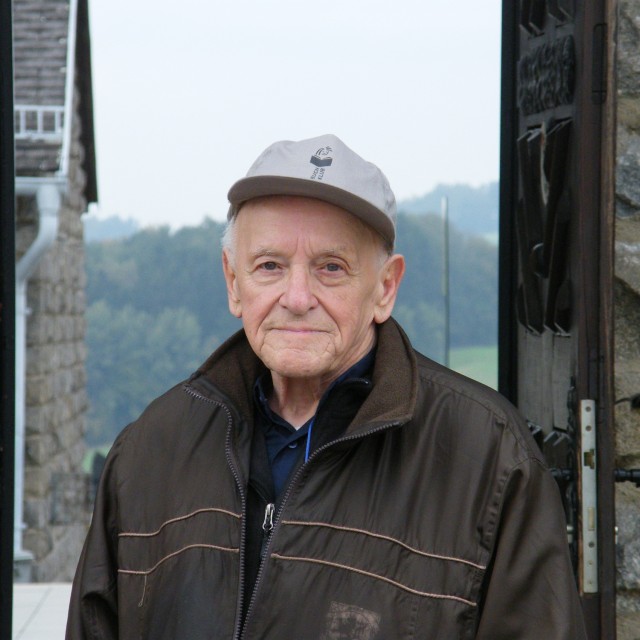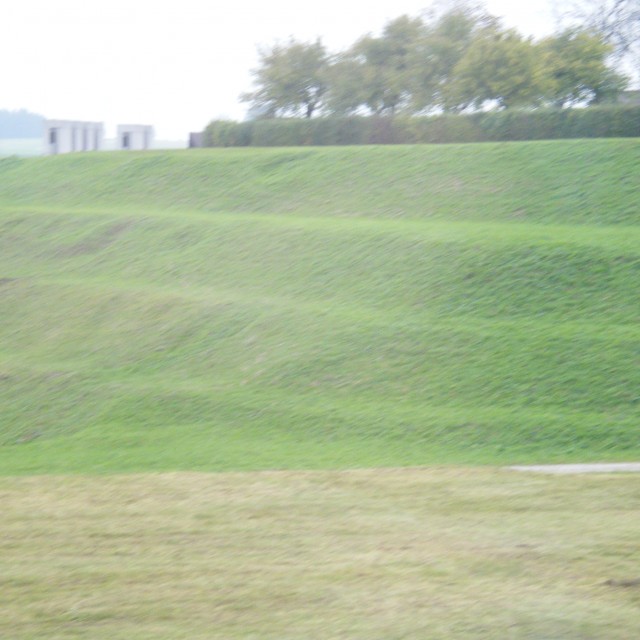Million Crickets in “Russenlager”
Josef Klat was imprisoned in the Mauthausen concentration camp during the Second World War. He was one of the lucky who managed to get into a good commando and, thanks to that, survived the war. However, he saw many people dying and he himself lost many friends. To this day, Josef Klat struggles to cope with the trauma of a concentration camp prisoner: “It was a beautiful evening, a summer one, and you could see millions of stars because there were no lights in Mauthausen. I went to the car to get something and suddenly it got dark. So I took the shortcut home to ‘Russenlager’ which lead through a stile. There I sat down for a moment, lit a cigarette and watched the stars. It was beautiful, romantic. And then crickets started to stridulate; but it was not five crickets, it was a whole million… Cricket orchestra! And all of them at the same time! And I realized: ‘Jesus! These are the souls of the people who died here. And all of a sudden I could see their bodies, how they were lying there…And I had to run away. Would you believe that that I had to run away?” Josef Klat nevertheless had the courage to face these moments again and again and he returns to the Mauthausen concentration camp regularly.
Hodnocení
Abyste mohli hodnotit musíte se přihlásit!
Trasy
Příběh není součastí žádné trasy.
Komentáře

Josef Klat
Josef Klat was born on June 16th, 1922 in Vienna into a family of so-called Viennese Czechs. His father and uncles left Czechoslovakia one by one and settled down in Vienna shortly after the Republic was formed. His mother was also of Czech origin. As Josef Klat was growing up in a foreign country, he took part in patriotic clubs like Sokol or Omladina Komenského, [Komenský's Youth - transl.]. The so-called Anschluss of Austria was the first occasion that young Czech patriots in Vienna saw as a sufficient reason to show their defiance to the dictatorship. Josef Klat joined the resistance immediately. He became a member of the Group of the Czechoslovak Section of the illegal Communist Party. As he himself stresses, his reasons for entering the Communist Party were not those of ideological communism, but purely those of organised resistance. He was active in the 21st district. His superiors were F. Nepožitek and Leo Němec. His first duties comprised of distributing informational pamphlets and also of painting communist slogans onto various Nazi buildings or important businesses. He later took part in various sabotage missions. As a member of the Austrian state, he was required to complete military service. Czech youngsters did however make use of the chance Hitler himself gave them, when he declared that he did not want Czechs in his army. In this way, most of the young Czech generation in Vienna avoided being drafted. However, this courageous step did mean receiving a negative entry on their record - they became politically suspicious persons. In July 1940, Josef Klat took part in another sabotage. It was successful, but he came under the scrutiny of the Gestapo. In November 1941 he and some forty other Czechs were arrested and brutally beaten. There was one SS man who was actually willing to help the youngsters and who advised them not to sign the confession, which would also be their death warrant. Those who listened to him survived. Klat was imprisoned in Mittergeis for almost a year. On September 27th, 1942, a group of Viennese Czechs was transferred to the concentration camp Mauthausen. The conditions in the camp were quite bearable for the Czechs by that time, in 1943. There was a considerable number of Czechs there that helped each other out a lot, some of them held very good positions, (H. Maršálek, J. Tobiášek and others). Josef Klat did switch through various labor gangs - he made tiles, cleaned the camp drains, hauled rubbish, and distributed bread. He later even became foreman of a labor gang, and as such was able to take part in helping the prisoners in camp - Czechs, Slovaks, and others. Probably the biggest and most dangerous operation was the smuggling of three thousand loaves of bread into the Rusenlager sub-camp. The SS men had decided to starve the prisoners of that section to death. After the liberation of Mauthausen on May 7th, 1945, Klat became a member of the International Committee of Political Prisoners of Camp Mauthausen. He took part in negotiations and recorded minutes of the meetings, but refused to take part in the Mauthaus-Gusen Camp trials. He returned to his family in Vienna. However, his family decided to return to Czechoslovakia due to the political atmosphere. Josef Klat settled down in Mariánské Lázně. He applied himself to his craft, working as a locksmith, later becoming master of a locksmith shop. Due to his experience and also his excellent knowledge of German, he also acted as a guide for those interested in or related to Mauthausen prisoners. He is still a member of the International Mauthausen Committee, he regularly attends memorial services at the Mauthausen camp.



